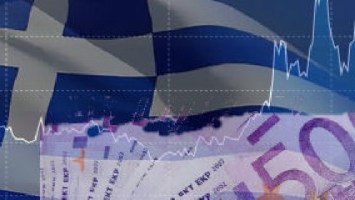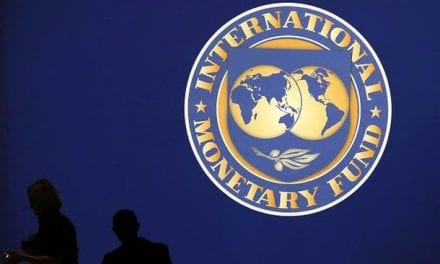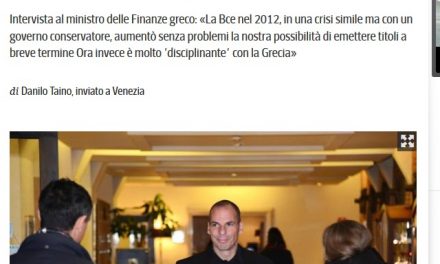The last time Greece’s bonds had this bad a week, the nation had just undergone the biggest debt restructuring in history, inconclusive elections had stoked concern it may exit the euro and Mario Draghi’s “whatever it takes” pledge was more than two months away.
The yield on Greek 10-year bonds has surged about 200 basis points this week, the biggest leap since the height of the euro-area sovereign-debt crisis in May 2012. Worse still, the yield on three-year notes, issued in July as part of Greece’s emblematic return to capital markets, have jumped more than 450 basis points, climbing above the longer-dated rates in a sign that investors are increasingly concerned the nation will be unable to pay its debt.
While Greek yields are still a fraction of what they were at the height of the crisis, the reason behind this week’s selloff has uncomfortable echoes for investors. Prime Minister Antonis Samaras, whose leadership allayed fears of a euro exit, has brought forward the process for choosing a new head of state, boosting concern it will require parliamentary elections next year. That comes as anti-bailout group Syriza, whose second place in May 2012’s vote helped spark that month’s rout, lead in opinion polls.
“We suspect Greece is becoming uninvestable again,” said Bill Blain, a strategist at Mint Partners Ltd. in London. “I think opportunistic investors will look to buy the dips and play potential scenarios, but our gut feel is Greece is going to be quarantined from rest of Europe this time.”
Weekly Decline
Greece’s 10-year yield rose six basis points, or 0.06 percentage point, to 9.15 percent at 4:30 p.m. London time today, having increased 192 basis points this week. The rate earlier reached 9.43 percent, the highest since September 2013. The 2 percent bond due in February 2024 fell 9.725, or 97.25 euros per 1,000-euro ($1,248) face amount, this week, to 64.955.
The nation’s three-year rate has surged 494 basis points to 10.94 percent this week. The price of the notes was 83.685, after being sold in July via banks at a price of 99.65 percent of face value.
Samaras said yesterday that the markets fear a victory for Syriza in potential elections next year and the party brings back talk of a Greek exit from the euro area. Syriza responded by saying the Prime Minister “doesn’t hesitate to beg markets to attack the country.”
Failure to rally enough support for Samaras’s presidential nominee, Stavros Dimas, by a third and final ballot on Dec. 29 would require the prime minister to dissolve parliament.
‘Very Worried’
“People are really very worried,” said Marc Ostwald, a strategist at ADM Investor Services International Ltd. in London. “It’s about the uncertainty. People aren’t thinking it’s a slam dunk that they will be new elections and Syriza will win, but the risks are extraordinarily high.”
In the week ended May 18, 2012, Greek 10-year yields climbed 439 basis points to 29.14 percent, a level more than three times the current rate. What’s also different this time is Greece’s ability to infect its European peers.
Spanish 10-year yields are up four basis points this week, compared with 26 in the week ending May 18, 2012. The eight basis-point increase in Italian 10-year rates is about a quarter of the 30 basis-point jump that week.
The euro area’s other peripheral nations have been insulated by speculation that the European Central Bank, led by Draghi, may extend its asset-purchase plan to include government bonds as soon as next month.
Draghi Pledge
That would be the latest bond-market supportive measure from the ECB, which has already cut interest rates to records, introduced a series of targeted loans and started buying covered bonds and asset-backed securities as it looks to make good on Draghi’s July 26, 2012 pledge to do “whatever it takes” to preserve the currency union.
Spain’s 10-year yield, which peaked at 7.75 percent in 2012, was little changed at 1.87 percent today, after touching a record-low 1.785 percent on Dec. 8. Italy’s equivalent rate was 2.05 percent, after reaching 1.942 percent the same day, also the least on record.
The isolated nature of Greece’s selloff will not last forever, according to Lena Komileva, chief economist at G Plus Economics Ltd. in London. In calling the vote before he’s reached a deal over Greece’s status once the bailout program ends next year, Samaras risks leaving a potential Syriza government to decide whether to stomach the demands of the nation’s so-called troika of creditors, including the European Union.
‘Tail-Risk Scenario’
“It is true that so far the ECB’s liquidity shield has isolated the latest Greek crisis from the rest of the eurozone,” Komileva said via e-mail. “Greece’s EU bailout quarantine however is nearing expiry. Without another Troika program next year, Greece is looking at a choice between an EU transfers union debt write-off or a euro exit and a disorderly default. In either tail-risk scenario, the shock ripple effects will be unlike anything seen during the eurozone crisis so far.”
Trading of Greek government bonds through the electronic secondary securities market, or HDAT, was 30 million euros yesterday, ANA reported. Monthly trading volumes plunged to zero in October 2011 from a peak of 136 billion euros in September 2004, Bank of Greece data show.
The yield on benchmark German (GDBR10) 10-year bunds, sought as a haven by investors at times of crisis, has dropped 15 basis points this week, the steepest decline since the period ended Sept. 27, 2013. The rate fell to a record 0.618 percent today.
Greek government securities returned 2.8 percent this year through yesterday, Bloomberg World Bond Indexes show. That’s down from 34 percent in the year through Sept. 5. Spain (GSPG10YR)’s have gained 15 percent, Italy’s 14 percent and Germany’s 9.4 percent.
Anxiety that voters will kick out leaders committed to Greece’s bailout wreaked havoc on the nation’s markets, with a three-day slump in stocks making them this year’s worst performers behind Russia.
The ASE Index (ASE) of shares had its worst week since 1987 and has lost 29 percent this year. Only Russia’s RTS Index did worse, with a 44 percent plunge.


















